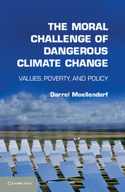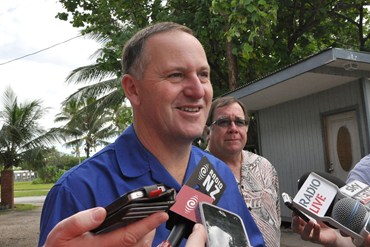 The combination of a recently acquired desktop video magnifier and a kindle has for the time being restored some ease to my reading. Hence this review. I was drawn by the title The Moral Challenge of Dangerous Climate Change: Values, Poverty and Policy, since I can’t see the resistance to energy reform mounted by powerful fossil fuel interests being overcome without some kind of moral determination by a significant portion of the population. I was also attracted by the fact that the author, Darrel Moellendorf is a political and moral philosopher and I was curious to read a philosophical perspective on the climate change issue.
The combination of a recently acquired desktop video magnifier and a kindle has for the time being restored some ease to my reading. Hence this review. I was drawn by the title The Moral Challenge of Dangerous Climate Change: Values, Poverty and Policy, since I can’t see the resistance to energy reform mounted by powerful fossil fuel interests being overcome without some kind of moral determination by a significant portion of the population. I was also attracted by the fact that the author, Darrel Moellendorf is a political and moral philosopher and I was curious to read a philosophical perspective on the climate change issue.
Although the book is intended to be accessible to readers who are not versed in the discipline of philosophy it is no light read. The discussions of the various policy issues it addresses are exhaustive and rigorous. There are no ringing calls, just appeals to humane rationality. But the conclusions are no less compelling for that.
Continue reading “The Moral Challenge of Dangerous Climate Change”

 Kathryn Ryan’s
Kathryn Ryan’s 
 The New Zealand Government has taken refuge from the challenge of climate change by recasting it as a matter of political positioning. This is nowhere more clearly seen than in the frequently reiterated claim that we are doing our “fair share” in the international effort to reduce emissions. It’s a brash claim in any case, when our unconditional 5 percent reduction target on 1990 levels by 2020 is compared with the 30 percent unconditional target of Norway and Switzerland or the 20 percent target of the EU as a whole. But the Government prefers comparison with our “trading partners” Australia, America and Canada, and also largely excludes the emissions associated with farming on the grounds that the world needs the food we produce.
The New Zealand Government has taken refuge from the challenge of climate change by recasting it as a matter of political positioning. This is nowhere more clearly seen than in the frequently reiterated claim that we are doing our “fair share” in the international effort to reduce emissions. It’s a brash claim in any case, when our unconditional 5 percent reduction target on 1990 levels by 2020 is compared with the 30 percent unconditional target of Norway and Switzerland or the 20 percent target of the EU as a whole. But the Government prefers comparison with our “trading partners” Australia, America and Canada, and also largely excludes the emissions associated with farming on the grounds that the world needs the food we produce.
You must be logged in to post a comment.